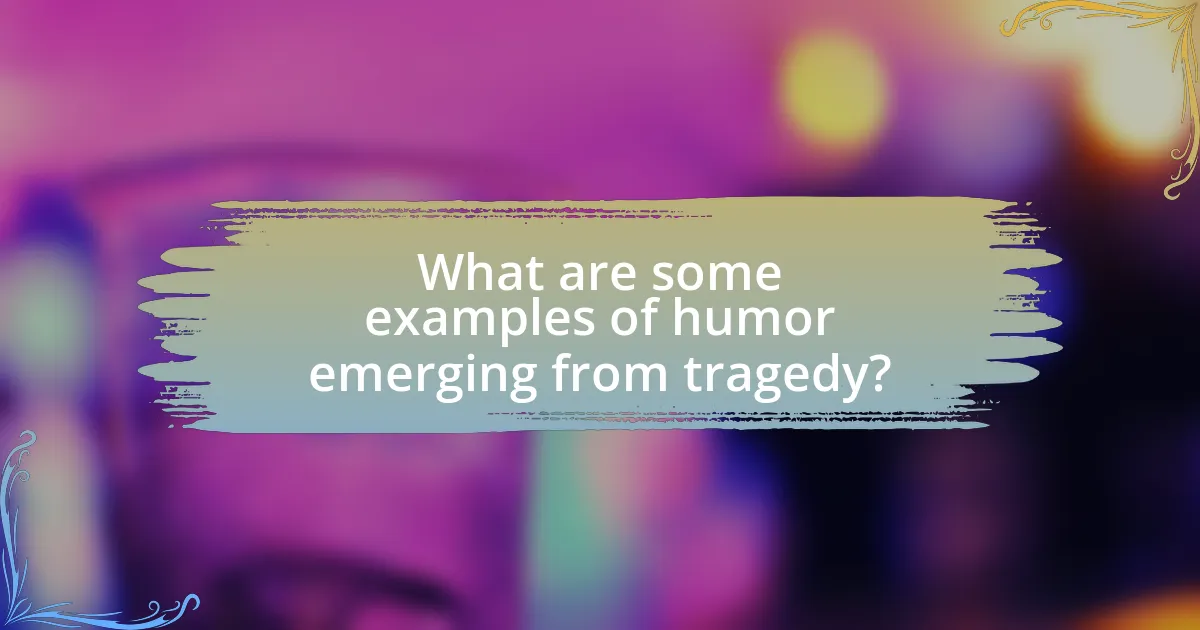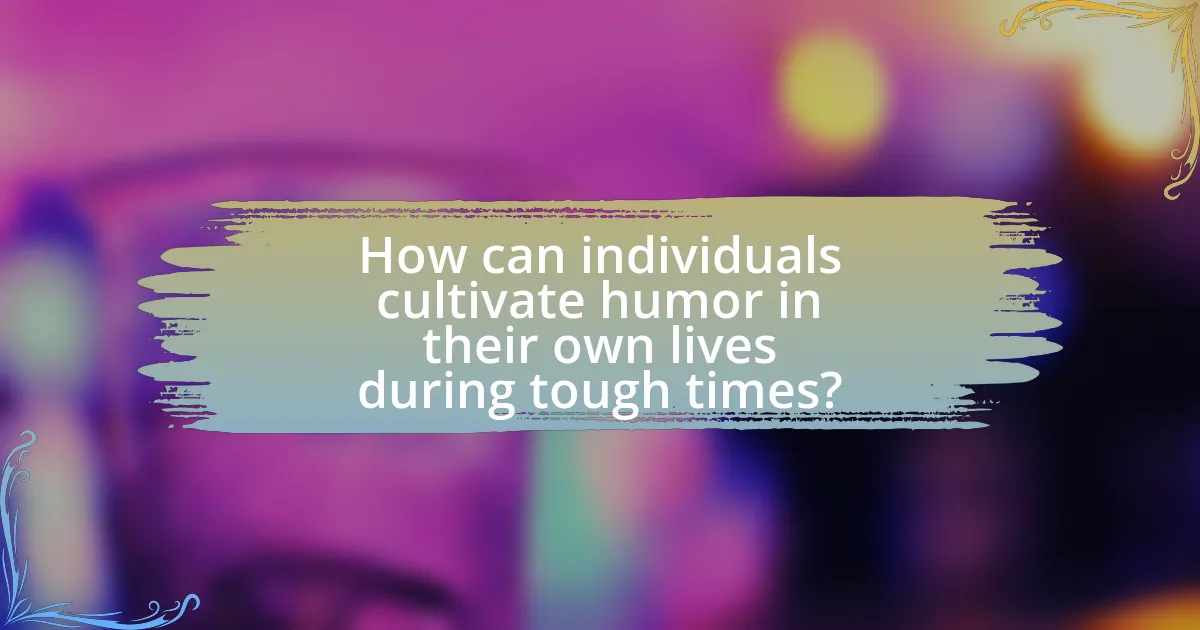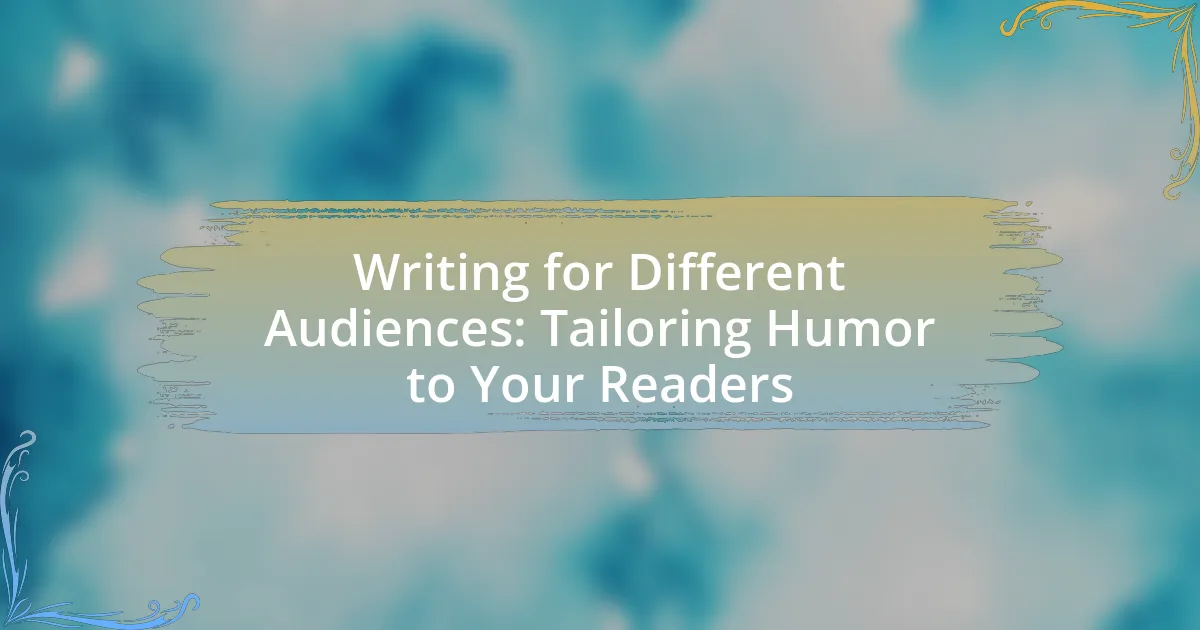The article “From Tragedy to Comedy: Finding Humor in Life’s Dark Moments” explores the concept of using humor as a coping mechanism during challenging times. It highlights how laughter can alleviate emotional pain, enhance resilience, and improve psychological well-being by triggering the release of endorphins. The article discusses various aspects of humor, including its role in processing grief, fostering social connections, and breaking the stigma surrounding mental health. Additionally, it provides practical strategies for individuals to cultivate humor in their lives, emphasizing the therapeutic benefits of laughter in navigating adversity.
What does it mean to find humor in life’s dark moments?
Finding humor in life’s dark moments means using laughter as a coping mechanism to alleviate emotional pain and stress. This approach allows individuals to reframe their experiences, making them more bearable and providing a sense of relief. Research indicates that humor can trigger the release of endorphins, which are natural mood lifters, and can enhance resilience during challenging times. For instance, a study published in the journal “Psychological Science” by authors such as Rod A. Martin demonstrates that humor can improve psychological well-being and help individuals navigate through adversity.
How can humor serve as a coping mechanism during tragedy?
Humor can serve as a coping mechanism during tragedy by providing psychological relief and fostering resilience. When individuals experience trauma or loss, humor can create a temporary escape from distress, allowing them to process their emotions in a less threatening way. Research indicates that laughter triggers the release of endorphins, which can alleviate pain and improve mood, thereby helping individuals manage their grief or anxiety. For example, a study published in the journal “Psychological Science” found that humor can enhance emotional resilience, enabling people to adapt better to adverse situations. This demonstrates that humor not only lightens the emotional burden but also promotes a healthier psychological response to tragedy.
What psychological benefits does humor provide in times of distress?
Humor provides significant psychological benefits in times of distress by reducing stress, enhancing mood, and fostering social connections. Research indicates that laughter triggers the release of endorphins, the body’s natural feel-good chemicals, which can alleviate feelings of anxiety and depression. A study published in the journal “Psychological Science” by Robert Provine found that humor can improve coping mechanisms, allowing individuals to better manage their emotional responses to challenging situations. Additionally, humor promotes resilience by enabling individuals to reframe negative experiences, making them more manageable and less overwhelming.
How does humor help in processing grief and loss?
Humor aids in processing grief and loss by providing a coping mechanism that allows individuals to express and navigate their emotions. It serves as a psychological buffer, reducing feelings of sadness and anxiety associated with loss. Research indicates that laughter triggers the release of endorphins, which can enhance mood and promote a sense of well-being. For instance, a study published in the journal “Psychological Science” found that humor can facilitate emotional resilience, helping individuals to reframe their experiences and find meaning in their grief. This ability to shift perspective through humor can foster social connections, as shared laughter often strengthens bonds among those who are grieving, creating a supportive environment for healing.
Why is it important to embrace humor in difficult situations?
Embracing humor in difficult situations is important because it serves as a coping mechanism that can alleviate stress and foster resilience. Humor activates the brain’s reward system, releasing endorphins that promote feelings of happiness and reduce pain perception. Research indicates that laughter can lower cortisol levels, which are associated with stress, thereby enhancing emotional well-being. For instance, a study published in the journal “Psychological Science” found that individuals who used humor during challenging times reported lower levels of anxiety and improved mood. This demonstrates that humor not only provides immediate relief but also contributes to long-term psychological health.
What role does humor play in resilience and recovery?
Humor plays a significant role in resilience and recovery by providing psychological relief and fostering social connections. It acts as a coping mechanism that helps individuals manage stress and adversity, allowing them to reframe negative experiences in a more positive light. Research indicates that laughter can trigger the release of endorphins, which are natural mood lifters, and can reduce levels of stress hormones like cortisol. For instance, a study published in the journal “Psychological Science” by Robert Provine found that laughter enhances social bonding, which is crucial for emotional support during recovery. Thus, humor not only alleviates emotional pain but also strengthens relationships, contributing to overall resilience.
How can humor foster connections with others during tough times?
Humor can foster connections with others during tough times by creating shared experiences that alleviate stress and promote bonding. When individuals laugh together, they release endorphins, which enhance feelings of happiness and reduce tension. Research indicates that humor can serve as a coping mechanism, allowing people to navigate difficult situations more effectively. For example, a study published in the journal “Psychological Science” by Robert Provine found that laughter is often a social phenomenon, reinforcing social bonds and enhancing group cohesion. This shared laughter can transform a challenging experience into a moment of connection, making individuals feel less isolated in their struggles.

What are some examples of humor emerging from tragedy?
Examples of humor emerging from tragedy include the use of dark comedy in films like “The Big Lebowski,” where characters navigate a kidnapping plot with absurdity, and “Jojo Rabbit,” which satirizes Nazi ideology through a child’s imaginary friend, Adolf Hitler. These works illustrate how humor can arise from serious themes, allowing audiences to confront difficult subjects while finding levity. Additionally, stand-up comedians like Louis C.K. and Sarah Silverman often draw on personal tragedies and societal issues, transforming painful experiences into relatable humor, demonstrating that laughter can coexist with sorrow.
How have comedians used personal tragedies in their routines?
Comedians have utilized personal tragedies in their routines as a means to connect with audiences through shared experiences and to find humor in difficult situations. By incorporating elements of their own hardships, such as loss, illness, or family issues, comedians like Louis C.K. and Tig Notaro have transformed pain into relatable content, allowing them to address serious topics while eliciting laughter. This approach not only serves as a coping mechanism for the comedians themselves but also resonates with audiences who may have faced similar challenges, creating a sense of community and understanding. Research indicates that humor can be a therapeutic tool, helping individuals process grief and trauma, which further validates the effectiveness of this comedic strategy.
What are notable examples of stand-up routines that address loss or hardship?
Notable examples of stand-up routines that address loss or hardship include Louis C.K.’s “Live at the Beacon Theater,” where he discusses the complexities of parenting and personal loss, and Hannah Gadsby’s “Nanette,” which tackles trauma and the impact of societal expectations on mental health. Additionally, Mike Birbiglia’s “Sleepwalk with Me” explores his struggles with sleep disorders and the emotional toll of relationships. These routines effectively blend humor with poignant reflections on difficult experiences, illustrating how comedians can navigate sensitive topics while engaging their audiences.
How do these examples illustrate the healing power of laughter?
The examples illustrate the healing power of laughter by demonstrating its ability to alleviate stress and foster emotional resilience during difficult times. Laughter triggers the release of endorphins, which are natural mood lifters, and can reduce levels of stress hormones, promoting a sense of well-being. For instance, studies have shown that individuals who engage in humor during challenging situations report lower anxiety and improved coping mechanisms. This physiological response, combined with the social bonding that often accompanies shared laughter, reinforces the notion that humor serves as a vital tool for navigating life’s adversities.
What are the cultural perspectives on humor in the face of adversity?
Cultural perspectives on humor in the face of adversity vary significantly across different societies, reflecting unique values and coping mechanisms. In many Western cultures, humor serves as a psychological defense mechanism, allowing individuals to process trauma and stress through laughter, as evidenced by the prevalence of dark comedy in media and stand-up performances. Conversely, in some Eastern cultures, humor may be more subdued and often emphasizes community resilience, where collective laughter fosters social bonds during difficult times. Research indicates that humor can enhance emotional well-being and facilitate recovery, as seen in studies like “The Role of Humor in Coping with Stress” by Martin and Lefcourt, which highlights humor’s effectiveness in reducing anxiety and promoting social support. Thus, humor acts as a universal tool for navigating adversity, albeit expressed differently across cultural contexts.
How do different cultures approach humor during crises?
Different cultures utilize humor during crises as a coping mechanism, often reflecting their unique social norms and values. For instance, in the United States, humor is frequently employed to alleviate stress and foster resilience, as seen in the use of satire and comedic relief in media during events like natural disasters. In contrast, cultures such as Japan may adopt a more subdued approach, using humor to maintain social harmony and avoid offending others, often through subtle, indirect jokes that emphasize collective experiences. Research indicates that humor can serve as a psychological buffer, helping individuals process trauma and build community bonds, as evidenced by studies like “Humor as a Coping Mechanism” by Martin et al., which highlights the role of humor in enhancing psychological well-being during challenging times.
What can we learn from global perspectives on humor and tragedy?
Global perspectives on humor and tragedy reveal that humor serves as a coping mechanism for dealing with adversity across cultures. Different societies utilize humor to process grief and trauma, demonstrating its universal role in human resilience. For instance, in many cultures, humor is employed in storytelling to address tragic events, allowing individuals to confront painful realities while fostering community bonds. Research indicates that laughter can reduce stress and improve emotional well-being, as seen in studies like those conducted by Robert Provine, which highlight the physiological benefits of laughter in stressful situations. Thus, understanding these perspectives enhances our appreciation of humor’s significance in navigating life’s challenges.

How can individuals cultivate humor in their own lives during tough times?
Individuals can cultivate humor in their lives during tough times by actively seeking out comedic content, engaging in playful interactions, and reframing negative experiences with a humorous perspective. Research indicates that laughter can reduce stress and improve mood, as evidenced by a study published in the journal “Psychological Science,” which found that humor can enhance resilience in the face of adversity. By incorporating humor into daily routines, such as watching comedies or sharing funny stories with friends, individuals can create a supportive environment that fosters laughter and lightens the emotional burden of challenging situations.
What strategies can help people find humor in their struggles?
One effective strategy for finding humor in struggles is reframing negative experiences into comedic narratives. This involves viewing challenging situations from a different perspective, allowing individuals to identify absurdities or ironic elements that can be humorous. Research indicates that humor can serve as a coping mechanism, reducing stress and enhancing emotional resilience. For instance, a study published in the journal “Psychological Science” by Martin et al. (2003) found that individuals who utilized humor in difficult situations reported lower levels of anxiety and greater overall well-being. Additionally, sharing these humorous stories with others can foster social connections, further alleviating feelings of isolation during tough times.
How can mindfulness and perspective shift enhance humor appreciation?
Mindfulness and perspective shift enhance humor appreciation by allowing individuals to become more aware of their thoughts and emotions, leading to a greater ability to recognize and enjoy humor in various situations. Mindfulness fosters a non-judgmental awareness of the present moment, which can help individuals detach from negative emotions and see the lighter side of challenging experiences. Research indicates that individuals who practice mindfulness report higher levels of well-being and a greater capacity for humor, as they can reframe situations and find joy even in adversity. A study published in the journal “Psychological Science” by researchers at the University of California found that mindfulness practices can increase positive emotions and humor appreciation, demonstrating the link between mindfulness, perspective shifts, and enhanced humor recognition.
What role does storytelling play in finding humor in adversity?
Storytelling plays a crucial role in finding humor in adversity by providing a framework for individuals to reframe their experiences and connect with others. Through narrative, people can transform painful or challenging situations into relatable anecdotes, allowing them to highlight the absurdities and ironies of their circumstances. This process not only fosters resilience but also encourages social bonding, as shared stories can elicit laughter and empathy from listeners. Research indicates that humor can serve as a coping mechanism, reducing stress and enhancing emotional well-being, which is particularly evident in therapeutic settings where storytelling is used to process trauma.
What are some practical tips for using humor to cope with life’s challenges?
Using humor to cope with life’s challenges can be effectively achieved through several practical tips. First, individuals can practice reframing negative situations by finding a humorous perspective, which helps reduce stress and promotes resilience. Research indicates that humor activates the brain’s reward system, releasing dopamine and enhancing mood. Second, engaging in light-hearted activities, such as watching comedy shows or reading funny books, can provide a mental break and foster a positive outlook. Studies show that laughter can lower cortisol levels, which are associated with stress. Third, sharing funny anecdotes with friends or family can strengthen social bonds and create a supportive environment, as social laughter has been linked to improved emotional well-being. Lastly, incorporating humor into daily routines, such as using playful language or jokes, can create a more enjoyable atmosphere, making it easier to navigate difficult times.
How can journaling or creative expression facilitate humor in dark moments?
Journaling and creative expression can facilitate humor in dark moments by allowing individuals to reframe their experiences and find levity in challenging situations. This process encourages self-reflection, enabling people to articulate their feelings and thoughts, which can lead to the discovery of absurdities or ironic elements in their circumstances. Research indicates that humor can serve as a coping mechanism, reducing stress and promoting psychological resilience. For instance, a study published in the journal “Psychological Science” by Martin et al. (2003) found that individuals who engage in humor during difficult times report lower levels of anxiety and greater emotional well-being. Thus, through journaling and creative outlets, individuals can transform their pain into humor, fostering a sense of connection and relief.
What resources or communities can support individuals seeking humor in tragedy?
Resources and communities that support individuals seeking humor in tragedy include online forums, support groups, and social media platforms dedicated to humor in difficult times. Websites like Reddit have specific subreddits such as r/wholesomememes and r/funny that provide a space for sharing light-hearted content related to personal struggles. Additionally, organizations like The Humor Project focus on the therapeutic benefits of humor, offering workshops and resources that emphasize laughter as a coping mechanism. Research indicates that humor can significantly improve mental health by reducing stress and enhancing resilience, making these communities valuable for those navigating tragic circumstances.
How can humor be a tool for healing and connection?
Humor serves as a powerful tool for healing and connection by fostering emotional resilience and creating social bonds. Research indicates that laughter triggers the release of endorphins, which promote feelings of well-being and alleviate pain, thereby aiding in emotional recovery. Additionally, shared humor can strengthen relationships, as it encourages open communication and mutual understanding, which are essential for social support. A study published in the Journal of Health Psychology found that individuals who engage in humor during stressful situations report lower levels of anxiety and greater life satisfaction, highlighting its role in coping mechanisms.
What are the best practices for sharing humor with others in difficult times?
The best practices for sharing humor with others in difficult times include being sensitive to the context, knowing your audience, and using light-hearted humor that fosters connection rather than division. Sensitivity is crucial; humor should not trivialize the struggles others are facing. Understanding the audience helps tailor the humor appropriately, ensuring it resonates positively. Light-hearted humor, such as anecdotes or gentle jokes, can provide relief and create a sense of camaraderie, as evidenced by studies showing that laughter can reduce stress and improve mood during challenging situations.
How can humor help break the stigma surrounding mental health and grief?
Humor can help break the stigma surrounding mental health and grief by creating a safe space for open dialogue and reducing feelings of isolation. When individuals use humor to address serious topics, it can normalize conversations about mental health and grief, making them more approachable. Research indicates that humor can serve as a coping mechanism, allowing people to process their emotions and experiences in a less threatening manner. For instance, a study published in the journal “Psychological Science” found that humor can enhance emotional resilience, enabling individuals to better manage stress and anxiety related to mental health issues. By fostering a culture where humor is integrated into discussions about these topics, society can diminish the stigma and encourage more individuals to seek help and share their experiences.




